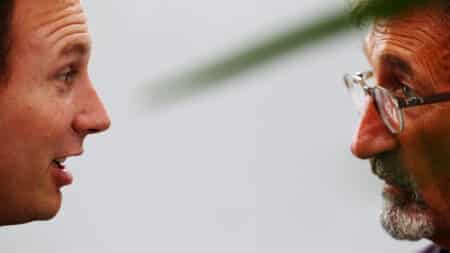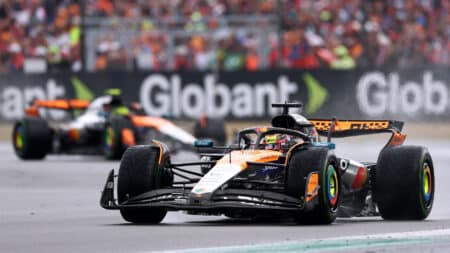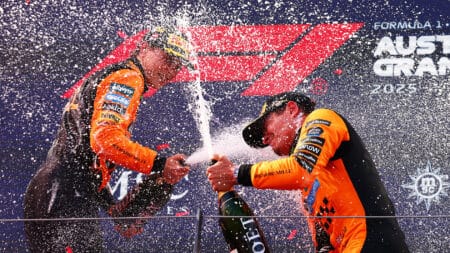
Horner's departure shows age of the maverick F1 boss is over
Christian Horner has now left Red Bull, the last of a certain breed of F1 team principal
Join me briefly if you will in 1984. We’re in North America where, for the first time and at last, Audi sales have started to gain traction, thanks in great part to the popularity of its attractive new 5000 model. And then disaster: reports of ‘unintended acceleration’ incidents start to mushroom, of Audis bursting free from their garages, running over their owners’ children and running amok despite the best efforts of their drivers stamping the brake pedal to the floor.
Except they weren’t. Years later the final report exonerated Audi completely and concluded what common sense had suggested all the time: the owners were standing on the wrong pedal. But by then the damage had been done, not just by the accidents, but Audi’s understandable refusal to lay the blame squarely where it belonged at their customers’ doors.

Photo: Wikimedia Commons
Seven years later, Audi sales were less one sixth of what they had been before a scandal from which it emerged entirely blameless. It took not years but decades for its reputation to be rebuilt – indeed, some would say that job remains a work in progress even in 2015.
Consider then the likely ramifications of the news that almost half a million Audi and VW diesel cars sold in the US were fitted with sophisticated software that could detect when the car was being tested rather than driven and only turned on its full battery of emissions equipment in those circumstances.
This is not a blunder as some have sought to portray it, but an illegal, calculated and hitherto successful attempt to bypass the very laws that allow the cars to be sold in the first place. One estimate suggests this could allow nitrogen oxides emissions to be 40 times as great as VW was claiming.
VW’s response was interesting, insofar as it made no attempt to cast doubt on the findings of the Environmental Protection Agency. Indeed VW CEO Martin Winterkorn said, “I personally am deeply sorry that we have broken the trust of our customers and the public.” This morning Michael Horn, the head of VW North America put it more bluntly: “Our company was dishonest; we totally screwed up.”

Martin Winterkorn
Where to from here? The numbers are boggling: VW can be fined up to $37,500 for every offending car, which would result in a total bill exceeding $18 billion. But stunning though such a figure is – and it’s larger than the GDP of a number of European countries – that’s not what’s likely to have been keeping Winterkorn and his colleagues up over the weekend. Nor is it even the class action lawsuit that as I write is gathering pace in the US. It’s the long term harm done to VW’s reputation not just in the US but around the world, not least because I suspect that agencies responsible for looking after the environment in every country in which VW Group cars are sold (which is most of them) will be examining its products in more than the usual detail.
Fact is diesel sales are tiny in the US, in Europe they are enormous: if it transpires something similar has been going on over here – well, the consequences are hard to imagine.
If there is an upside to this for VW, or less of a downside relative to the unintended acceleration stories of the 1980s, it is that at least no-one should be able to prove physical harm as a result of the scandal, though given the culture of litigation in the US I’d not bet against at least a few trying. Ultimately this is an issue of secrets and lies, not personal safety and is a lot less damaging as a result.
Even so, I think it would hard to overestimate the size of this story and its likely impact on VW’s reputation, even if all the bad news is already out which I very much doubt. In bald terms, what is by some measurements the world’s largest car company appears to have deliberately set out to deceive the environmental administrators of the world’s largest economy.
Clearly if VW’s name is to be salvaged it can’t just sit back and take the punishment, it must seen to be pro-active and on top of the situation. Just saying sorry isn’t going to be nearly good enough.

I have no better idea than you at what level the extraordinary decision to try to fool the EPA was signed off and how much further (if at all) the deception was taken, but I do know reputations take decades to build and seconds to trash.
Martin Winterkorn’s incredible leadership of this company and the seeing off of Ferdinand Piech is one of the great industry stories of our time but this is by far his biggest challenge to date. He will now have to decide whether the company needs him now more than ever, or needs more than ever for someone to be seen to carry the can.
In the meantime, ask yourself this: are the chances of an Audi-branded VW Formula 1 team in 2019 made more or less likely by these revelations? On Monday, VW’s share price in Frankfurt fell by over 18 per cent, its largest ever fall. Right now I imagine F1 is just about the last thing on its mind.
Update: Martin Winterkorn resigned as chairman of VAG on September 23

Christian Horner has now left Red Bull, the last of a certain breed of F1 team principal

Was Oscar Piastri the real winner in the long run after Silverstone? asks James Elson

Lewis Hamilton hadn't won in almost three years – and then produced a sensational victory at Silverstone 2024. James Elson explains why it was his best ever

Describing this year's championship race as a 'battle' might be slightly over-egging it, writes James Elson